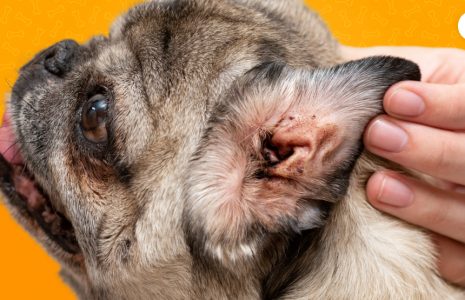Does a Dog with Down Syndrome Exist? Here’s What Science Says About It!


Ever wonder if your furry friend could have a genetic condition like Down syndrome? You’re not alone. Many dog owners and lovers have asked the same question. After all, dogs and humans share much of the same DNA, and some genetic disorders and medical conditions that affect people can also impact dogs.
As science and veterinary medicine have progressed, researchers have looked into whether Down syndrome, a genetic condition caused by an extra chromosome, can occur in dogs. While rare, it turns out dogs can exhibit symptoms similar to Down syndrome in humans.
However, the condition looks a bit different in dogs. Check out what science says about dog with down syndrome here and what are the health conditions in dogs similar to Down syndrome.
What Is Down Syndrome?

In simple terms, Down Syndrome is a genetic disorder that occurs when a human baby is born with three copies of chromosome 21 instead of the usual two. This results in a number of physical and intellectual disabilities.
In humans, common signs of Down syndrome include:
- Distinctive facial features like a small nose, flat face, and almond-shaped eyes.
- Poor muscle tone and motor skills. Toddlers may learn to walk later and have trouble climbing stairs.
- Slower learning and delayed development of speech and language skills. While intelligence can vary, most individuals have mild to moderate intellectual disabilities.
- There is a higher risk of health issues like congenital heart defects, hearing loss, poor vision, and thyroid problems. Regular medical checkups and early intervention services are critical.
- Shorter stature than average is also a symptom of Down syndrome. Adults with Down syndrome are usually shorter and weigh less than average.
- Difficulty with problem-solving, logical reasoning, and abstract thinking. Most can learn and develop vocational and life skills with support and practice.
While dogs can exhibit symptoms that resemble Down syndrome in humans, they do not actually have the same chromosomal disorder. However, some dogs may be born with physical and intellectual disabilities due to other genetic issues or injuries during fetal development.
If a dog shows signs of delayed development or learning difficulties, it is best to consult a vet to determine if there are any medical issues and how best to support the dog’s well-being. Early intervention and training can help set disabled dogs up for success.
Can Dogs Have Down Syndrome?

So do dog with Down syndrome actually exist? It’s a question many dog owners have pondered. The short answer is no, dogs do not get Down syndrome like humans. However, they can be born with genetic abnormalities that cause similar developmental delays and physical characteristics. In this section, we have explained in detail why dog with down syndrome cannot exist. Read on.
Chromosomal Disorders In Dogs:
Dogs have 78 chromosomes compared to humans’ 46, so they will not have the exact trisomy of chromosome 21 that causes Down syndrome in people. However, dogs can have other chromosomal disorders that lead to developmental and physical issues:
Trisomy:
Having an extra chromosome. The most common is trisomy 13, which can cause cleft palate, eye problems, skeletal malformations, and learning difficulties.
Monosomy:
Missing a chromosome. Monosomy 13 in dogs can have similar effects to trisomy 13.
Translocations:
Parts of chromosomes are rearranged or exchanged places. This can impact development and sometimes lead to miscarriages.
While not the same as Down syndrome, these chromosomal abnormalities in dogs can result in some comparable challenges, like congenital heart disease, delayed development, behavior issues, and a shorter lifespan. The good news is dogs with these conditions can still live happily with proper veterinary care, nutrition, training, and lots of love.
If you think your dog may have a chromosomal disorder, the only way to confirm is through genetic testing. Speak to your vet about testing options and the best ways to care for your canine companion. With patience and the right support, dogs with special needs can make wonderful life-long friends.
Health Conditions In Dogs That May Look Similar To Down Syndrome:

If your dog is showing certain behaviors or physical characteristics that seem unusual, it could indicate a genetic abnormality. Some signs to watch for include:
Delayed Development:
Is your dog slower to learn basic behaviors and commands than others of the same age and breed? Developmental delays can be a sign of a genetic issue.
Physical Abnormalities:
If you notice unusual facial features that are slightly different than what dogs of the same breed have, then it is also a sign of a genetic disorder.
Here are some of the common signs of genetic disorders in dogs:
- short nose, small ears, wide-set eyes,
- short stature or disproportionate body size,
- excessive skin, especially on the head and face
- crooked or malformed limbs
Behavioral Issues:
Hyperactivity, anxiety, aggression, or other temperament issues could point to a genetic cause. Lack of impulse control or problems with socialization are also possible indicators.
Health Problems:
Health conditions such as recurrent infections, a weak immune system, and vision or hearing loss are associated with some genetic disorders in dogs. Neurological issues like seizures, tremors, or poor coordination may have a genetic component.
If your dog shows multiple signs from these categories or symptoms are severe, it’s a good idea to have your vet examine them. Genetic testing may be recommended to determine if a DNA mutation or chromosomal abnormality is present. Early diagnosis and treatment can help manage symptoms and improve your dog’s quality of life.
While the possibility of a genetic disorder can be upsetting, many dogs with abnormalities live full and happy lives with proper care and support from their owners. Doing research on your dog’s specific condition will help you provide the best care. With love and patience, you can nurture their genetic uniqueness.
Wrapping Up:
So, to sum up, dogs with Down syndrome don’t exist since they have a different number of chromosomes than humans. However, they are still susceptible to genetic disorders that produce similar intellectual disabilities and physical characteristics.
The good news is dogs with these conditions can still live happily with proper care and accommodations.
At the end of the day, every dog deserves a loving home regardless of ability or disability. If you’re thinking of getting a new furry friend, consider opening your heart to a special needs pooch. You’ll be rewarded with a lifetime of unconditional love and tail wags.









Leave A Comment